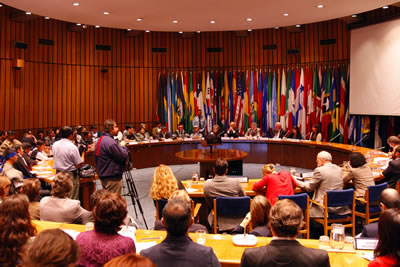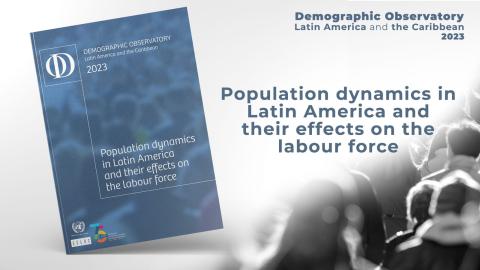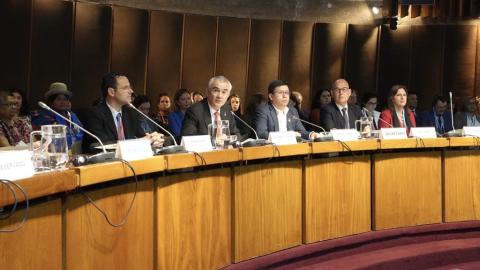Briefing note
(5 April 2012) Today, the Economic Commission for Latin America and the Caribbean (ECLAC) presented the document Desigualdades territoriales y exclusión social del pueblo mapuche en Chile: Situación en la comuna de Ercilla desde un enfoque de derechos (Territorial inequalities and social exclusion of the Mapuche people in Chile: Situation of the Ercilla commune under a human rights-based approach), jointly elaborated with the Mapuche Territorial Alliance (ATM, for its acronym in Spanish).
The goal of this study is to generate a socio-demographic and socio-environmental overview of the Mapuche population in the Ercilla commune (Araucania Region, Chile) and provide a methodological, historical approach showing the gaps found within the commune regarding indigenous peoples rights enshrined in international instruments.
Along the drafting process, the principles stated in ILO (International Labor Organization) Convention 169 and in the United Nations Declaration on the Rights of Indigenous Peoples, especially the territorial and full participation rights of Indigenous Peoples, were considered.
"For us, the most important thing within this document is its methodological value, as well as the likely impact of its results into public policy. We are highlighting the process that led to the creation of this document; the open dialogue for identifying what to know and how to know it; respect to each individual's knowledge; and the value of mutual discernment," stated Alicia Bárcena, Executive Secretary of ECLAC, when presenting the report.
"We hope this release will contribute to the achievement of greater equality, to the understanding of problems from a multi-cultural perspective, to the search for solutions in full respect of the individual and collective rights of Indigenous Peoples, as well as to the development of the Araucania Region in Chile, while becoming a methodological example to address similar problems in other countries in Latin America and the Caribbean," she added.
In turn, Juan Catrillanca, Ñizol Longko of ATM, acknowledged the presence of the participants to the document presentation and mentioned the main problems the Mapuche people are currently facing.
"I would like to greet ECLAC and its authorities, especially Alicia Bárcena, Antonio Prado - Deputy Executive Secretary - and Luis F. Yáñez - Officer-in-Charge of the Secretariat of the Commission - who have welcomed us in this space and have allowed us to elaborate on our topics," he stated.
As expressed in the document, according to the last national census in 2002, 5% of the population identifies itself as part of one of the eight ethnic groups recognized in Chile, being the Mapuche the largest indigenous group with more than 604,000 inhabitants. In Ercilla, 46.5% of the population is Mapuche, which makes it one of the communes with the largest population of this ethnic origin.
The research indicates that poverty levels affecting the Mapuche population in Ercilla are higher than those registered at other Mapuche populations in the rest of the province of Malleco and the Araucania Region, as four out of ten Mapuche individuals live below the poverty line. Moreover, there are important differences when compared to non-Mapuche people due to the fact that the average income of a Mapuche is three times lower than that of a non-Mapuche.
The ECLAC and ATM document states that the socio-demographic and socio-territorial vulnerability of this people - which generates clear implementation and rights gaps - is caused by the loss of territory - which is the basis of the material and cultural survival of the Mapuche people -, the reduction of Mapuche population, progressive degradation of agricultural soil in the areas they inhabit - mainly due to the expansion of forestry industry in the commune - and the lack of water resources in communities.
The document reports on institutional progress achieved since the 1990s for regulating the relationship between the Government and Indigenous Peoples. Likewise, it states a series of challenges for filling gaps related to the implementation of indigenous rights in compliance with international agreements, especially those that have ratified ILO Convention 169 and the United Nations Declaration on the Rights of Indigenous Peoples.
Among these agreements are the establishment of dialogue processes and the adoption of long-lasting social covenants that allow for the implementation of the rights of Indigenous Peoples recognized in the Convention and the Declaration; the re-definition of state policies on indigenous lands in tune with international standards; and the implementation of territorial sustainability plans and programmes that focus on recovering degraded soil and fostering the development of peasant and indigenous economies in order to guarantee the right to survival of Mapuche communities.
See also:
For further questions, please contact ECLAC's Public Information and Web Services Unit. E-mail: dpisantiago@cepal.org ; Tel.: (56 2) 210 2040.
Follow us on: Twitter, Facebook, Flickr and YouTube.



